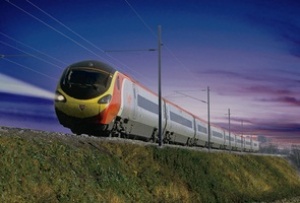Railway investment delivers £3.2bn boost to businesses across Britain

Investment in a bigger, better rail network generated more than £3.2bn of work for businesses across Britain over the last year, according to new figures released today by Network Rail.
More than a third – around £1.2bn – of the money spent in 2012/13 went to small and medium-sized businesses, helping support economic growth and jobs across a range of industries from telecoms suppliers and glazers to solar energy engineers and security providers.
This investment has sustained over 90,000 full-time jobs nationwide in addition to the 34,000 people directly employed by Network Rail, generating significant financial returns to central government through tax revenue and savings on benefits as well as boosting local economies.
The enhancement schemes carried out by Network Rail’s major projects division included the redevelopments of King’s Cross, Reading and Birmingham New Street stations, Crossrail, the Thameslink Programme upgrade plus dozens of other schemes to improve stations, lengthen platforms and build new railway.
Chief Secretary to the Treasury, Danny Alexander, said: “Investing in infrastructure has a direct effect on the economy, creating jobs, and giving Britain the infrastructure we need to build a stronger economy and fairer society.
ADVERTISEMENT
“This report is excellent in highlighting the opportunities for small and medium sized businesses that come with infrastructure investment. That is why we have set out £100bn of investment in infrastructure over the next Parliament, including supporting the largest programme of investment in rail since the Victorian era. I’m very glad to see that Network Rail are doing their bit to drive sustainable and balanced economic growth across the UK.”
Simon Kirby, managing director of Network Rail Infrastructure Projects, said: “The rail industry is increasingly recognised as a key contributor to our national, economic and social well-being. Across Britain, investment in a bigger, better railway has provided a massive boost to hundreds of businesses of all shapes and sizes, supporting sustainable economic growth and jobs.”
The rail industry’s supply chain is both extended and varied, ranging from professional services to the construction industry. Rail investment is therefore an important driver of growth across many of the UK’s industrial sectors.
In the last four years, Network Rail has generated £17.3bn of work for its supply chain, of which £6.2bn has been with small and medium-sized businesses – a 22% increase on the previous four years. Planned enhancements and renewals expenditure between 2014 and 2019 is approximately £25bn, with 99% of this work to be undertaken by UK-based companies.
Capital investment in rail also pays back over the longer term through wider socio-economic benefits. A good example of this is the Northern Hub project, designed to boost the economic growth of the north of England through value for money improvements to rail services. The project delivers wider economic benefits valued at over £4 for every £1 invested, and it has been estimated that this project alone will deliver an annual contribution to the northern economy of £2bn.
Simon Kirby continued: “Every day, more than three million rail journeys are made in Britain and the railway transports millions of tonnes of goods between ports and shops. But railways don’t just move people and freight. Railways connect homes and workplaces, businesses with markets, create jobs, stimulate trade and support the growth of a balanced economy.
“Network Rail will have a pivotal role to play in driving sustainable economic growth over the next five years, with plans to add 700 more trains each day between the key cities of the north, increase London’s rail capacity by 20%, build new lines to increase capacity in Scotland and electrify hundreds of miles of railway so cleaner, faster trains can run. By continuing to invest in rail, we are investing in the future of Britain.”

